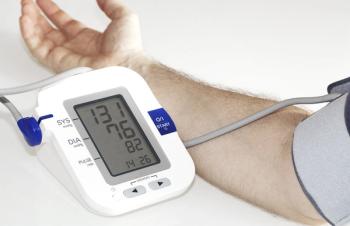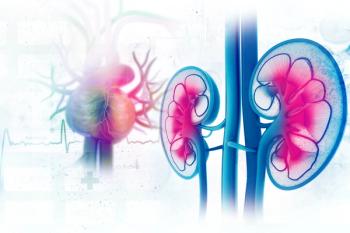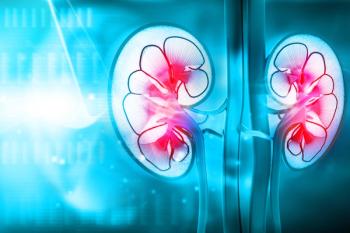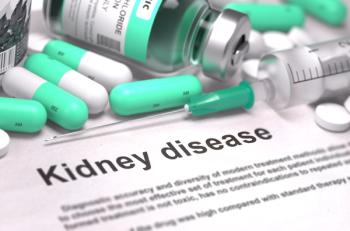
Chronic Kidney Disease
Latest News

Latest Videos

CME Content
More News

Sarah Wells Kocsis, MBA, is co-author of the Milken Institute report, “Chronic Kidney Disease: Finding a Path to Prevention, Earlier Detection, and Management.” She spoke to The American Journal of Managed Care® about the findings of the report and how they can be incorporated into care for patients with chronic kidney disease (CKD).

A recent study found that the largest Medicare Advantage plans pay large markups to large dialysis organizations, and these inflated payments could increase out-of-pocket expenses for patients.

Coverage from the 2022 Congress of the American Society for Preventive Cardiology (ASPC) in Louisville, Kentucky, featuring 3 experts on aspects of hypertension treatment: Keith C. Ferdinand, MD, of Tulane University School of Medicine; Kim Allan Williams, MD, of the University of Louisville; and George C. Bakris, MD, of the University of Chicago Medicine.

A new trial has found that patient management through remote means could reduce all-cause mortality and hospitalizations for heart failure (HF) in patients with renal impairment.

A recent modeling study found that allocating kidneys to patients receiving dialysis was a better use of the organs from a societal perspective compared with giving kidneys to those on a preemptive waiting list.

A retrospective cohort study found that frailty was prevalent in patients with chronic kidney disease (CKD) and that the adverse effects could include end stage kidney disease (ESKD) and mortality.

A recent study found that lipid dysregulation was predictive of the risk of chronic kidney disease (CKD) and occurred years before the onset of CKD.

A population-based cohort study found that carbon monoxide and sulfur dioxide exposure was associated with chronic kidney disease (CKD).

A prospective cohort study found that in patients with chronic kidney disease, large differences in their glomerular filtration rate (eGFR) based on cystatin C vs creatinine were associated with risk of incident heart failure (HF).

A systematic review found that there was a bidirectional relationship between glaucoma and chronic kidney disease (CKD), especially in participants of East Asian descent.

A randomized, controlled, nonblinded trial found that nutritional treatment with supportive education could help improve renal function in patients with chronic kidney disease (CKD).

A new genome-wide polygenic score was able to determine the risk of chronic kidney disease (CKD) in patients with a score in the top 2%.

The utility of value-based frameworks for payers, providers, and those involved in kidney care delivery was addressed during a session at AHIP 2022.

A qualitative study found that patients with chronic kidney disease (CKD) were more likely to avoid thinking about their disease because of the stress from dialysis.

The FDA plans to set a maximum nicotine level in cigarettes and tobacco products to reduce addictiveness; a bipartisan bill would place a $35 monthly cap on insulin for patients with private insurance or Medicare; the Supreme Court ruled that an Ohio hospital’s employee health plan did not violate federal law by limiting coverage for outpatient dialysis.

An observational study found that erythropoiesis-stimulating agent (ESA) usage was associated with increased risk of malignancies in patients with chronic kidney disease (CKD) or end-stage renal disease.

A retrospective cohort study found that sodium-glucose cotransporter 2 inhibitors were associated with a reduced risk of chronic kidney disease (CKD) in adults with type 2 diabetes.

A retrospective study found that 3 machine learning models demonstrated equivalent predictability and greater sensitivity in the prognosis of chronic kidney disease (CKD) compared with the Kidney Failure Risk Equation.

A study found that patients in the Comprehensive End-Stage Renal Disease (ESRD) Care Model saw a decrease in hospitalizations and readmissions compared with the accountable care organization (ACO) model.

Early detection of chronic kidney disease (CKD) in adolescents in minority groups can be beneficial to future treatment, according to a recent editorial.

A population-based cohort study found that patients with chronic kidney disease (CKD) or who underwent a recent kidney transplant had a higher risk of cancer compared with people with normal kidney function.

A longitudinal cohort study found that mild albuminuria was associated with cognitive decline, worse baseline cognitive function, and increased risk of incident cognitive impairment and dementia.

A recent study found that patients with chronic kidney disease (CKD) had a poor prognosis based on glomerular filtration rate (GFR), ankle-brachial index (ABI), and high systolic blood pressure in a 16-week exercise program.

Real-world treatment of diabetic kidney disease in the United States, based on national-level health care claims and electronic health records data, is inconsistent with the current guidelines.

By predicting which individuals are most likely to require therapies for chronic kidney disease within the next year, health plans can better organize resource allocation to smooth or delay the transition for the patient, according to Rehan Waheed, MD of Quest Diagnostics.














